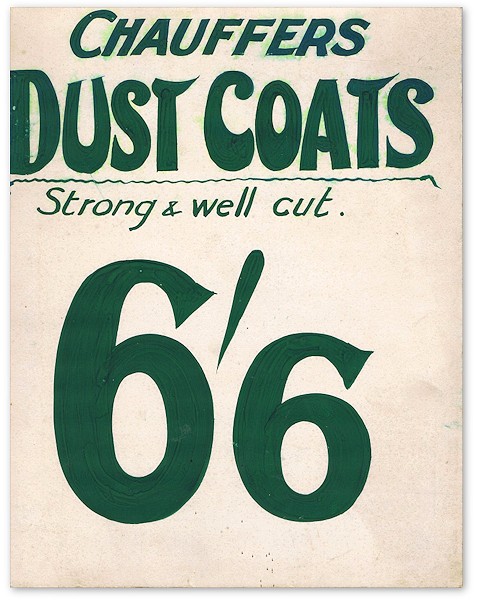 |
|
| News About Us Membership Events Links |
|

Life Below the Stairs - Joining the DotsAs the seasons of that wonderful television epic Downton Abbey roll by, one can't help but wonder what it was really like to be one of the many household staff. Clearly they are in a framework designed and defined by the society of the age. They have their place - but it is 'below the stairs'. We have come to know them very well, but how well did society know them? When I saw this illustrated sign at a vendor's stand at Spitalfield Market in London, I connected with it immediately and couldn't resist buying it for a few pounds. It has great graphics presence, but also social overtones. If you 'join the dots' you can draw a picture of what it was really like to be part of the household servant infrastructure. The first dot: If you had a chauffeur, he needed to be properly attired. Uniforms get dirty when a chauffeur washes the Rolls Royce, unless he has the protection of coveralls. Driving in a seat, partly covered at best, can deposit a lot of dust on a pristine uniform. The solution is to equip your chauffeur with a dust coat. When he delivers his master and/or mistress at their destination, he can remove the dust coat and present a proper, formal appearance. Given that he is at the call of the family at any time, he may present a formal appearance, but he could look fairly tired! At best he has a name - probably his surname. So Fred Wilson is not Fred - he is Wilson. Ironically, it's also what a Lord of the realm would do - Lord Beatty merely signs as 'Beatty'; Lord Sutherland as 'Sutherland' and so on. A second dot: Look at a ship's Passenger List of the era. On a First Class Passenger List on board the four-funnelled elegant and prestigious Cunarder RMS Aquitania, sailing from Southampton to New York on December 4, 1920, we see "Mrs. Wolcott Warner and Maid"; "Mr. S. S. Keyser and Valet"; Mr. C. P. Coleman was accompanied by his (presumably male) Secretary . One woman, Mrs. R. W. Leatherbee was attended by "three maids". These servants didn't have names on the Passenger List; they were little better than chattels. It's ironic that slavery as such had been formally abolished for many decades, but some servants had a life that was no better than being in slavery. A third dot: "Why didn't they quit?" you may ask. Just like today, prospective employers look for references. For women with little education, there were very few alternatives to service. For men, there were labouring jobs, clerical positions, or shop keeping jobs - but employers still sought references and the servant wanting other employment was at the mercy of his wealthy former employer - who may also have had powerful social connections at the highest level of prospective organisations. So household service was not necessarily the secure, comfortable job that is sometimes pictured. We've joined the ephemera dots. Have you got the picture? John G. Sayers is in his 7th year on the Council of The Ephemera Society and is in his 9th year on the Board of The Ephemera Society of America. He has been a keen collector for many years.
|
|
|
Home | News | About Us | Membership | Events | Links | Contact | Item of the month | Articles |
| Copyright © The Ephemera Society 2025. All Rights Reserved. |